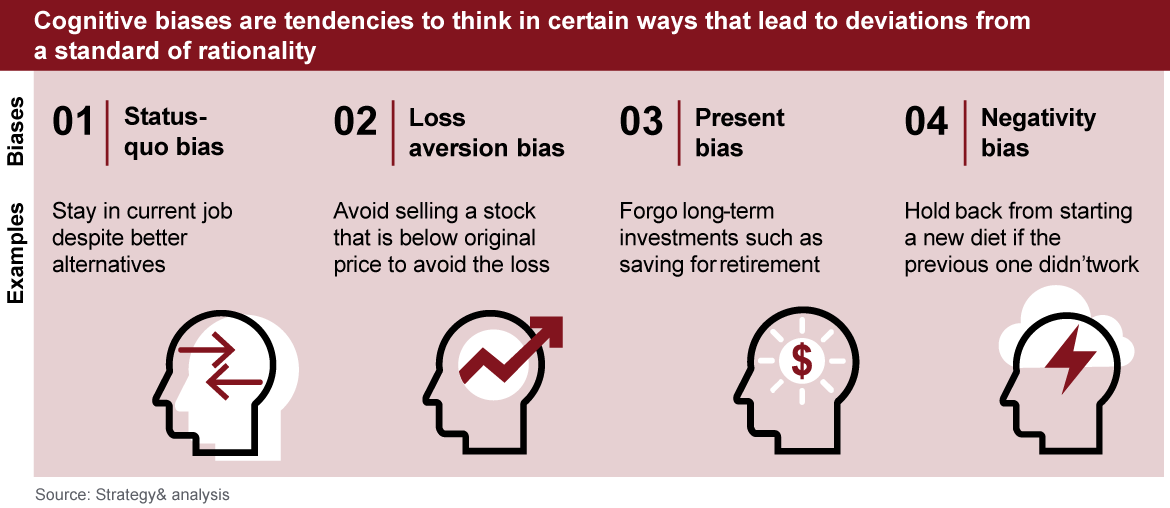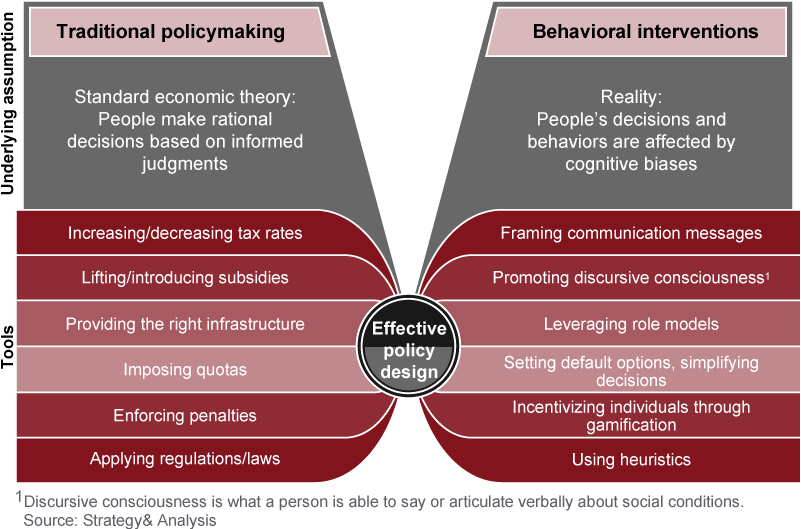{{item.title}}
{{item.text}}

Download PDF - {{item.damSize}}
{{item.text}}
In the past few years, the term, “behavioral insights” has been used more widely to describe a new approach to policy design.
Behavioral science incorporates insights from economics, psychology, sociology, and neurology to understand what makes people tick, and on this basis, it launches interventions that improve their responsiveness to public policies, without restricting their freedom of choice.
This approach is rapidly spreading: policymakers across the world now use behavioral science to engage their citizens more effectively. The 2017 Nobel Prize in Economics was awarded to Richard Thaler, a pioneer of behavioral economics.
The behavioral science approach holds considerable promise for GCC governments: by incorporating it in policymaking, they could for example improve their citizens’ health, achieve environmental sustainability, and promote effective parenting.
Conventional policy levers such as fines, incentives, or taxes, used by governments have not always succeeded in altering behaviors. This is because such an approach assumes that individuals make rational choices leading to the best possible outcome.
The behavioral science approach addresses “cognitive biases,” which are people’s natural tendencies to ignore rules, regulations, incentives, and penalties even when this goes against their self-interest.
Behavioral science insights complement standard policymaking by delivering a more realistic view of human behavior and allowing for fine-tuning and adaptation throughout the process. For behavioral interventions to succeed, governments should put in place the supporting infrastructure and adequate conventional policy levers, in addition to implementing the right behavioral tools.
Behavioral interventions may take the form of “nudges,” tools that influence people’s decisions without imposing restrictions or altering their incentives, thus preserving their freedom to choose. They should be transparent and not misleading, easy to opt out of, and should aim to improve people’s welfare. The most common examples include:
Leveraging communication campaigns based on deep cultural and psychological insights to effectively enable the desired change.
Designing interventions in schools (updated curricula, training sessions, field trips) and special content segments on media channels educates audiences on intended behaviors.
Selecting brands or public personalities or creating fictitious characters to champion a desired behavior can encourage more people to follow suit.
Positioning a desired outcome as the default option (e.g., making a green plan for household electricity consumption the default choice) increases individuals’ participation rate.
Giving individuals opportunities to earn achievements when they engage in a desired behavior — through personal goal-setting or competitions on social media, for example.
Creating mental “shortcuts” like songs, visual cues, can speed up decision-making process (e.g., people easily remember the “5-a-day” recommendation to eat the right amount of fruits and vegetables).
By applying behavioral interventions in the right places, GCC countries can effectively achieve the key objectives outlined in their national transformation plans.
Strategy& analyzed transformation programs in GCC states and prioritized their main objectives by weighing the proportion of behavioral interventions against structural levers used to achieve them, as well as the success of behavioral interventions implemented globally to achieve similar objectives.
According to data from the World Health Organization (WHO), obesity rates across the GCC are among the highest in the world.
Average obesity rate in 2016 (% population over 18 years old)
A behavioral intervention to encourage more physical activity is an important component in reducing the prevalence of obesity. For example: Singapore’s Health Promotion Board started the National Steps Challenge campaign in December 2015, to encourage working professionals to lead a more active lifestyle.
#MY10KTODAY social challenge
GCC countries rank in the top-ten worldwide in terms of per capita solid waste generation.
The China Environment Protection Agency successfully incorporated behavioral insights into one communication campaign to improve recycling rates. The campaign, which took place on a Shanghai street, triggered Chinese citizens’ sense of peer pressure and attention to social standing to improve their sorting performance.
As GCC countries introduce a value added tax (VAT), limited awareness of the concept of VAT and its benefits could lead to non-compliance.
In this case as well, behavioral interventions can effectively prompt citizens and institutions to file taxes more promptly. For example, the Kenya Revenue Authority designed an integrated awareness campaign in 2014 that used slang language to encourage taxpayers to reconsider their attitudes.
iTax awareness campaign
Behavioral insights should also be taken into account across the policymaking process to ensure the soundness of policy design, reduce redundancy costs, and allow for effective fine-tuning of interventions.
To start using behavioral insight, GCC policy makers need to build their behavioral capabilities and pilot interventions. This means creating a behavioral insights unit with a well-established operating model, piloting high-impact intervention, measuring their impact, and finally raising awareness on their success.
Governments around the world have incorporated behavioral insights units through one of three models: centralized, decentralized, or hybrid. The choice of model depends on the institutional culture of the country and the intensity of behavioral interventions.
We spoke to the University of Chicago professor and co-founder of the Behavioral Insights and Parenting Lab.













Menu